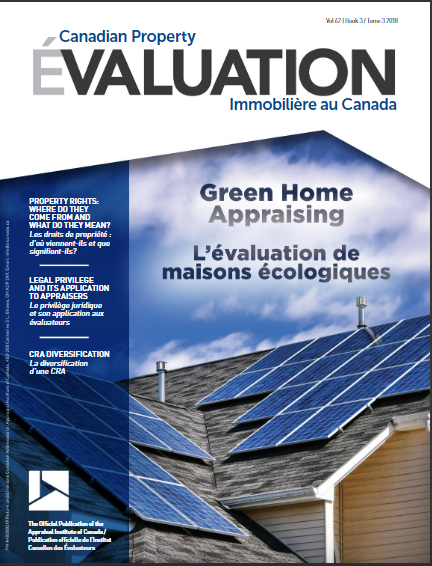Rent review: does the existing lease matter?
Canadian Property Valuation Magazine
Search the Library Online
Rent review: does the existing lease matter?
By John Shevchuk, Barrister & Solicitor, C.Arb, AACI (Hon)
When reviewing rent under a lease, does the decision-maker rely upon the terms and conditions of the existing lease or is there another reference point? The answer depends, of course, on the wording in the lease and can turn on some fine distinctions.
General principles for rent review clauses
General principles for interpreting leases are set out in Park Royal Shopping Center Holdings Ltd. v. Gap (Canada) Inc., 2017 BCSC 1257 [Park Royal] where the court considered a co-tenancy provision in a mall under renovation and tenancy closures during the renovation. At paragraphs 51 and 52, the court wrote:
[51] As noted in Athwal v. Black Top Cabs Ltd., 2012 BCCA 107:
[42] The contractual intent of the parties to a written contract is objectively determined by construing the plain and ordinary meaning of the words of the contract in the context of the contract as a whole and the surrounding circumstances (or factual matrix) that existed at the time the contract was made, unless to do (sic) would result in an absurdity.
[52] The “interpretation of a written contractual provision must always be grounded in the text and read in light of the entire contract:” Creston Moly Corp. v. Sattva Capital Corp., 2014 SCC 53 at para. 57.
Among other things, the courts pay heed to the usual commercial purpose behind rent review clauses.
The commercial purpose behind rent review clauses
In Basingstoke and Deane Borough Council v. Host Group Ltd., [1988] 1 WLR 348 (Eng. C.A.) [Basingstoke], a case that has been adopted in Canada, the English Court of Appeal identified the default commercial purpose of rent review clauses. The lease in question provided a 99-year term for a bare site restricted to public house use, the tenant having constructed the improvements at its own expense. The landlord argued new rent should be based on a hypothetical lease reflecting what the property would likely lease for in the current market and without any restriction on use. The tenant asserted that the object was to determine rent consistent with the terms and conditions in the existing lease save for the amount of rent.
The Court of Appeal agreed with the tenant stating in part “… it is proper and only sensible, when construing a rent review clause, to have in mind what normally is the commercial purpose of [a rent review clause].” The court then described the commercial purpose:
That purpose has been referred to in several recent cases, and is not in doubt. Sir Nicolas Browne-Wilkinson V.-C. expressed it in these terms in British Gas Corporation v. Universities Superannuation Scheme Ltd. [1986] 1 W.L.R. 398, 401:
“There is really no dispute that the general purpose of a provision for rent review is to enable the landlord to obtain from time to time the market rental which the premises would command if let on the same terms on the open market at the review dates. The purpose is to reflect the changes in the value of money and real increases in the value of the property during a long term.”
In Basingstoke, the court held that this commercial purpose can only be realized by setting rent in accordance with the terms and conditions in the existing lease save for the amount of rent to be paid. The court recognized that express wording or necessary implication from the words of a particular lease can displace the default commercial purpose. However, the lease in question did not displace the commercial intent with the result that the rent reset was account for the restricted use as a public house and not a more general, unrestricted use that would drive a higher rent. Further, since the lease was for a bare site (the tenant having constructed the improvements) the rent to be determined was for a bare site without regard for the value of the buildings on site.
Contrast the result in Basingstoke, with the British Columbia Court of Appeal decision in Fire Productions Ltd. v. Lauro, 2006 BCCA 497 [Fire Productions]. The tenant leased space from the landlord to use as a restaurant. The tenant paid for all the improvements. The lease provided that the improvements, once affixed, became the property of the landlord. The rent review clause required a determination of the “fair market rent.” The arbitrator held that this meant inclusion of the value of the improvements, while the chambers judge held that the value of the improvements was to be excluded. The Court of Appeal held that the value of the improvements was to be taken into account in setting the rent for the renewal period.
At paragraph 7, Lowry J.A., writing for the Court of Appeal, stated in part:
7 … It seems clear to me that the use of the word ‘market’ in this lease to define the rent to be paid for the renewal can only mean that the rent to be paid is the rent the premises would attract if exposed to the market at the time of the renewal. In my view, the language precludes excluding the value of the tenant’s improvements in calculating the rent.
The court rejected the tenant’s argument that it was unfair that the tenant should have to pay rent on the improvements during the renewal term since it had paid for them in the first place. At paragraph 14, Lowry J.A wrote:
14 It seems to me a landlord might well lease unimproved premises on the basis that he will gain the advantage of taking a proprietary interest in improvements the tenant will have to make in order to use the premises for an agreed purpose. The advantage could well be reflected in the rent for which the premises are leased. If at the end of the lease the tenant vacates the premises and they revert to the landlord, the tenant loses the value of the continued use of the improvements he made and the landlord gains the advantage for which he bargained when the premises were leased. The tenant has not been disadvantaged if on exercising his right of renewal he is required to pay the rent the landlord would be able to obtain if the lease was not renewed. The tenant may in one sense be paying interest on the improvements he made, but he has the continued use of the improvements, which have become the property of the landlord, to the end of the renewal period. It is all a matter of the bargain driven when the parties enter into the lease and it is then essential that effect be given to the wording the parties actually employed to express their bargain in any given instance. In this case, the bargain made in terms of the renewal rent to be paid favoured the landlords.
One might sympathize with the tenant who was required to pay rent for the very improvements it put in place, but the case highlights the importance of precise delineation of the parties’ intent behind a rent review clause. If the intent is not clear from the lease, the interpretation of a court or arbitrator may come as a surprise.
Determining fair market value v. fair market rent
In No. 100 Sail View Ventures Ltd. v. Janwest Equities Ltd., 1993 CarswellBC 283 [Janwest], leave to appeal refused 1994 CarswellBC 3169 (SCC), there was a lease for bare land upon which the tenant constructed and operated a hotel. In the course of time, a rent renegotiation clause was activated:
On or before the end of the tenth year of the term, the base rent payable shall be renegotiated to a value equal to 10% of the fair market value of the leased premises as bare land at the date of the review …
A clause of the lease restricted use … only for the purpose of a hotel and related hospitality businesses. The question was whether a restricted use provision was to be taken into account when setting the new base rent. The Chambers Judge concluded that the restricted use provision should be taken into account. A majority of the Court of Appeal disagreed.
At paragraph 29, Hollinrake J.A. writing for the majority stated that the phrase “fair market value of the Leased Premises as bare land” must be interpreted as necessarily inferring that the valuation be done without reference to the lease and, consequently, without reference to the restricted use found in the lease. “I think that to factor in the lease or the restricted use in it would result in the landlord being denied the fair market value of the land “as bare land.”
The Court of Appeal distinguished Janwest in Pacific West Systems Supply Ltd. v. B.C. Rail Partnership, 2000 BCCA 247 [Pacific West] on the basis that in Janwest, the determination was “fair market value” of the bare land whereas in Pacific West the issue was “fair market rental” of the bare land. According to the court, in determining fair market value of the land, the underlying lease is ignored whereas in the determination of fair market rental of the land, the lease terms are relevant including the restriction on use provision.
At paragraphs 11 and 13, Lowry J.A., writing for the court, stated:
11 The landlord purports to rely on the majority decision [Musqueam v. Glass (SCC)] to support the proposition that contractual restrictions are not relevant to a notional lease of land. Writing for the majority, Mr. Justice Gonthier said that market value is generally the exchange value of land without regard for a tenant’s interest, it being of no consequence that a tenant may not employ the best use of the land (para. 38). But, like the chambers judge, I do not consider what was said about the determination of the current value of land there to bear upon the determination of the fair market rental of land. The two are different concepts. Different considerations arise. Where in Musqueam the court was concerned with the value of the land, here the concern is the rental rate the lands would attract at the time of the review. It seems to me the terms of the lease the tenant holds are critical to that determination. Those are the terms it must be assumed the landlord would offer in the market, not some other terms permitting a different use that would attract a higher rate of rent.
…
13 In the absence of express provision to the contrary, I see no sound basis on which it can be said that the parties to this lease can have intended that the tenant be put in the position of paying rent based on the unrestricted use of the lands when it is precluded from enjoying what may be the highest and best use.
In reaching this conclusion, Lowry J.A. referred to and relied upon Basingstoke.
Conclusion
Knowing what decision-makers will accept as the default commercial purpose of a rent review clause takes a landlord and a tenant only so far. That commercial purpose can be displaced by express words or by necessary implication from the words in the lease and surrounding circumstances.
This article is provided for the purposes of generating discussion and to make practitioners aware of certain challenges presented in the law. It is not to be taken as legal advice. Any questions relating to the matters discussed herein should be put to qualified legal and appraisal practitioners.





